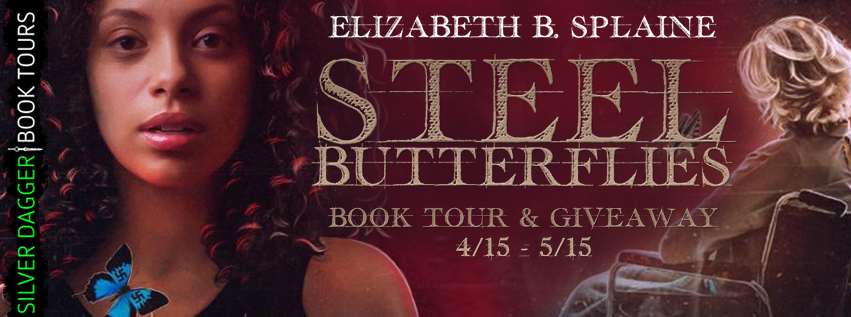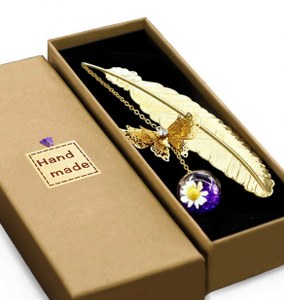Steel Butterflies
by Elizabeth B. Splaine
Genre: YA/ Women's Historical WWII Fiction
Deadly
secrets & destructive, unintended consequences are unearthed in
this coming-of-(s)age story of an unlikely friendship between a
teenage girl and a former WWII spy.
Some
truths are best left unspoken.
Ebony
Dobbs has problems: unruly hair, not fitting in with the popular
kids, figuring out how to pay for college…and a secret she’s
buried so deeply even she doesn’t
know the truth. A kick-butt best friend Connor Leibovitz, uses his
computer genius to dig into a new secret...
Ebony reluctantly
accompanies her mother on a home health visit, meeting Madame Celeste
DeWit, a 97-year-old with a closet full of skeletons from WWII. As
Ebony learns the truth about Madame’s wartime exploits, she comes
to terms with her own past, realizing she and Madame share more than
they differ.
When Connor uncovers information that implicates
Madame’s estate manager in a plot to steal the old woman’s
fortune, the teenagers launch a campaign to protect her, even as
Madame’s past barrels into the present, threatening to destroy
everything in its path.
Inspired
by real people and places, Steel
Butterflies will
have you marveling at the beautiful simplicity of true friendship, as
well as the courage of women who come face-to-face with determining
their future.
My version of happiness was shattered during the war when many of us were tested in unimaginable ways. I now truly understand what is important and what is not.”
Ebony leaned forward. Now this was some information she could put to good use. “So…what’s important?”
A cloud crossed Madame’s features. “I cannot answer that for you, my dear. What is important to me may not be important to you. You are on your own journey of discovery. I am a bold woman, but I am humble enough to realize I have no right to dictate importance. Young people today seek validation through others. But when you allow others to form your worth, you don’t do the hard work of determining what’s truly important to you. You’re cheating yourself out of integrity and losing the strength of having convictions to live by.”
Ebony twisted her mouth in thought. Although she’d been lectured to about qualities her generation lacked, no one had ever framed the argument in such a forthright, honest manner. When she sifted through Madame’s comments, she realized she didn’t want to be responsible for cheating herself out of anything. “I’ve never thought of it that way.”
“Just as true strength is quiet, grace and dignity are found within oneself. You will never find inner peace on a computer screen or by how many likes you get on a post; those are hollow and don’t stand up to even a small breeze. We have choices each day. Between right and wrong, kindness and cruelty, faith and faithlessness. It’s what we do with our ability to choose that defines who we are, what we stand for. So here is my question for you, my dear Ebony. What do you stand for?”
**Also by the author in the same genre**
Swan Song
by Elizabeth B. Splaine
Genre: YA/ Women's Historical WWII Fiction
Ursula Becker's operatic star is on the rise in Nazi Berlin...until she discovers that she is one-quarter Jewish, a mischling of the second degree. Although Hitler is aware of her lineage, her popularity and exquisite voice protect her and her family from persecution. As Ursula's violin-prodigy half-sister comes of age, she comes to the attention of the Führer, who welcomes the awestruck teenager into his elite, private circle.
When William Patrick Hitler arrives in Germany and is offered employment by his doting Uncle Adolf, a chance encounter with Ursula leads to a romantic relationship that further shields the young diva from mistreatment. But for how long?
Restrictions on Hitler's perceived enemies tighten, and Ursula is ordered to sing at Hitler's Berghof estate. There she throws down a gauntlet that unleashes the wrath of the vindictive megalomaniacal leader. Fearing for her life, Ursula and Willy decide to emigrate to England. But as the ship is about to sail, Ursula disappears. Desperately hoping that Ursula is still alive, Willy crosses the globe in an effort to find her, even as his obsessive uncle taunts him, relishing in the horror of the murderous cat-and-mouse game.
Prologue
Hitler was a monster.
Except he wasn’t.
He was a narcissistic sociopath who convinced millions of people to join his cult.
In his early years, observers might have called him a simple man. Or a man who lived simply in a tiny apartment with as close to a friend as Adolf Hitler would ever have. Hitler met August Kubizek at the Linz opera after Hitler’s family moved to Linz following the death of his father. Like all of Hitler’s relationships, the friendship was largely one-sided. As Hitler vacillated between silence and raving diatribes about perceived wrongs, his roommate was doomed to listen and nod appropriately until Hitler finally exhausted himself. His friendship with Kubizek ended abruptly when the young man returned from the holidays to find that Hitler had moved out, leaving no trace. For reasons known only to Hitler’s troubled mind, he had decided to end the relationship as suddenly as it had begun.
Hitler’s relationships with women were no less muddled and one-sided. While living with Kubizek, he fell in love with a young woman named Stefanie whom he spotted on the street. Over a period of months, he loved her from afar and never approached her. Instead, he fantasized about their life together and imagined that he communicated with Stefanie through telepathy. According to Kubizek, Hitler truly believed that Stefanie understood his thoughts and shared his unspoken passion. He even discussed the idea of kidnapping her, until Kubizek astutely pointed out that he had no money to support her. The fact that kidnapping is legally and morally wrong never came into consideration.
Hitler’s “love” was all-consuming, volatile, twisted. To him, loving someone meant possessing her, smothering the person’s spirit and will until she became a part of him. If, for some reason, the supply of love was severed, the victim suffered greatly, having poured herself- heart, mind, and soul- into Hitler. Subjugation was an unspoken requirement when becoming involved with Hitler. In the process, the person lost her own identity, her sense of self. And when that has happened, what remains? A husk, a shell, with roiling emotions and a desperate sense of loss. Stefanie escaped by never actually engaging with the megalomaniac. Other women were not so fortunate. At least seven women committed suicide after being involved with Adolf Hitler.
But of the seven, only one adversely affected Hitler.
Hitler was forty years old when he became the legal guardian of his half-sister’s daughter, Angela “Geli” Raubal, who was twenty-three. They lived together in a well-appointed apartment in Munich, her bedroom located right next to his. According to all accounts, Hitler adored Geli, and she enjoyed being the object of his attention. He showered her with gifts and paid for voice lessons when she showed some interest in the craft. He preened with her on his arm and thundered when she showed any interest in spending time with other men.
The relationship had limits, however, as Geli showed no interest in marrying him, and he was unable (or unwilling) to force his will on her. Still, he yearned to possess her, to control her every move. Seeing himself as a talented artist, he painted lewd pictures of her in the nude which were stolen in an effort to blackmail him (and reacquired through purchase from the blackmailer.) There are stories that he slashed her with a bullhide whip he often carried. But she remained by his side, like so many abused partners. She stayed until she could stand it no more. On the night of September 18, 1931, following yet another screaming match, Geli shot herself in the heart with one of Hitler’s Walther revolvers. Hitler was out of town. Geli’s body was discovered the following morning by the housekeeper, Annie Winter.
Next to the passing of his mother, whose picture he carried with him until his death, the suicide of Geli had the most dramatic effect on Hitler’s psyche. He ordered the suicide covered up, and, for the next two weeks he barely ate and rarely slept. According to confidants, he had to be physically restrained from committing suicide. In Hitler’s twisted mind, the death of Geli elevated her to a saint. Her bedroom became a shrine in which fresh flowers were placed each day to honor her memory. A full-length painting of Geli hung in Hitler’s alpine home near Berchtesgaden, commonly known as the Berghof. Underneath the painting always sat another bowl of fresh flowers. Hitler carried Geli’s picture next to his mother’s until his own death (by the same pistol Geli had used) in 1945. As his memory reinvented the young woman, her suicide became regal, an honorable, heroic choice to which he would refer again and again over the ensuing years.
There were several events in Hitler’s life that drove him closer and closer to the insane, autocratic tyrant he eventually became. But the guilt he felt at Geli’s suicide was the trigger that fully unleashed his complete lack of morality and conscience. As Robert Payne so aptly describes Hitler’s mental deterioration in The Life and Death of Adolf Hitler, “She was of his blood and flesh, almost a daughter and almost a wife, closer to him than anyone else in the world. To have caused her death was to have committed the ultimate crime; the guilt would remain, never to be washed away. Henceforth, he was free from all of the conventional ties of morality…He had gone beyond good and evil, and entered a strange landscape where…all the ordinary human values were reversed. Like Dostoyevsky’s Grand Inquisitor, he succumbed to ‘the dread spirit of death and destruction.’”
It is important that you, dear reader, understand Hitler’s state of mind as he makes the acquaintance of a beautiful young opera singer named Ursula Becker. In this story, he has been following her career from afar, much as he followed (and courted) Stefanie only in his mind. It has been several years since the death of his beloved niece when he finally meets Ursula Becker, who so closely resembles Geli that Hitler cannot help but be drawn to her. He yearns to possess Ursula, to consume her. But her will is strong and her personality rebellious. As she continues to defy him, his broken mind conflates the two women and, over time, the truculent Ursula becomes Geli. Hitler is left with two choices: once again cause the death of someone he cherishes or allow her to live and openly defy him. The personal decisions he makes, as seen through Ursula’s eyes, reflect the turmoil he continues to create throughout the world.
This is not a novel about Adolf Hitler, who died like a coward in an underground bunker instead of facing the atrocities for which he would have been held accountable. This is a story that represents the victims, a story about one woman’s struggle to survive against overwhelming odds as the object of a crazy person’s possessive passion. This is a love story that spans continents and time, war and cruelty. This is a story of the worst and the best that human nature has to offer, a tale of the resilience of the human spirit, of the Light against interminable darkness. And we all know that, in the end, despite the unthinkable atrocities that were waged on the innocent, the Light overcame the darkness.
Respectfully Yours,
Elizabeth B. Splaine - February 2021
Elizabeth B. Splaine wrote the Dr. Julian Stryker series of “Blind” thrillers (Blind Order and Blind Knowledge), as well as Devil’s Grace, the winner of the When Words Count writing competition, released through Greenwriters Press. Her most recent book, Swan Song, an historical fiction novel, was released in October 2021 through Woodhall Press.
Prior to writing, Elizabeth earned an AB in Psychology from Duke University and an MHA from University of North Carolina, Chapel Hill. She spent eleven years working in health care before switching careers to become a professional opera singer and voice teacher.
When not writing, Elizabeth teaches classical voice in Rhode Island where she lives with her husband, sons, and dogs.
Website * Facebook * Twitter * Instagram * Bookbub * Amazon
Follow the tour HERE for special content and a giveaway!
A beautiful gold butterfly bookmark,











The excerpts sound good. I enjoyed the post.
ReplyDeleteThanks, Marcy! Pls reach out after you’ve read it.
ReplyDelete